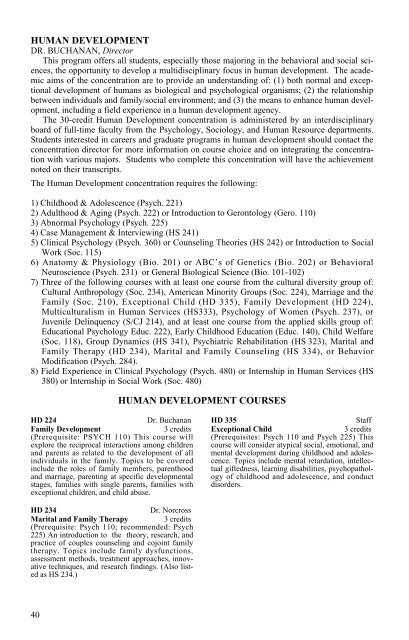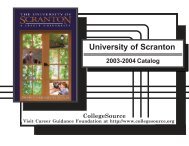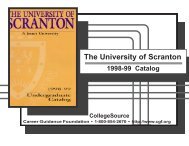Create successful ePaper yourself
Turn your PDF publications into a flip-book with our unique Google optimized e-Paper software.
HUMAN DEVELOPMENT<br />
DR. BUCHANAN, Director<br />
This program <strong>of</strong>fers all students, especially those majoring in the behavioral and social sciences,<br />
the opportunity to develop a multidisciplinary focus in human development. <strong>The</strong> academic<br />
aims <strong>of</strong> the concentration are to provide an understanding <strong>of</strong>: (1) both normal and exceptional<br />
development <strong>of</strong> humans as biological and psychological organisms; (2) the relationship<br />
between individuals and family/social environment; and (3) the means to enhance human development,<br />
including a field experience in a human development agency.<br />
<strong>The</strong> 30-credit Human Development concentration is administered by an interdisciplinary<br />
board <strong>of</strong> full-time faculty from the Psychology, Sociology, and Human Resource departments.<br />
Students interested in careers and graduate programs in human development should contact the<br />
concentration director for more information on course choice and on integrating the concentration<br />
with various majors. Students who complete this concentration will have the achievement<br />
noted on their transcripts.<br />
<strong>The</strong> Human Development concentration requires the following:<br />
1) Childhood & Adolescence (Psych. 221)<br />
2) Adulthood & Aging (Psych. 222) or Introduction to Gerontology (Gero. 110)<br />
3) Abnormal Psychology (Psych. 225)<br />
4) Case Management & Interviewing (HS 241)<br />
5) Clinical Psychology (Psych. 360) or Counseling <strong>The</strong>ories (HS 242) or Introduction to Social<br />
Work (Soc. 115)<br />
6) Anatomy & Physiology (Bio. 201) or ABC’s <strong>of</strong> Genetics (Bio. 202) or Behavioral<br />
Neuroscience (Psych. 231) or General Biological Science (Bio. 101-102)<br />
7) Three <strong>of</strong> the following courses with at least one course from the cultural diversity group <strong>of</strong>:<br />
Cultural Anthropology (Soc. 234), American Minority Groups (Soc. 224), Marriage and the<br />
Family (Soc. 210), Exceptional Child (HD 335), Family Development (HD 224),<br />
Multiculturalism in Human Services (HS333), Psychology <strong>of</strong> Women (Psych. 237), or<br />
Juvenile Delinquency (S/CJ 214), and at least one course from the applied skills group <strong>of</strong>:<br />
Educational Psychology Educ. 222), Early Childhood Education (Educ. 140), Child Welfare<br />
(Soc. 118), Group Dynamics (HS 341), Psychiatric Rehabilitation (HS 323), Marital and<br />
Family <strong>The</strong>rapy (HD 234), Marital and Family Counseling (HS 334), or Behavior<br />
Modification (Psych. 284).<br />
8) Field Experience in Clinical Psychology (Psych. 480) or Internship in Human Services (HS<br />
380) or Internship in Social Work (Soc. 480)<br />
HD 224 Dr. Buchanan<br />
Family Development 3 credits<br />
(Prerequisite: PSYCH 110) This course will<br />
explore the reciprocal interactions among children<br />
and parents as related to the development <strong>of</strong> all<br />
individuals in the family. Topics to be covered<br />
include the roles <strong>of</strong> family members, parenthood<br />
and marriage, parenting at specific developmental<br />
stages, families with single parents, families with<br />
exceptional children, and child abuse.<br />
HD 234 Dr. Norcross<br />
Marital and Family <strong>The</strong>rapy 3 credits<br />
(Prerequisite: Psych 110; recommended: Psych<br />
225) An introduction to the theory, research, and<br />
practice <strong>of</strong> couples counseling and cojoint family<br />
therapy. Topics include family dysfunctions,<br />
assessment methods, treatment approaches, innovative<br />
techniques, and research findings. (Also listed<br />
as HS 234.)<br />
40<br />
HUMAN DEVELOPMENT COURSES<br />
HD 335 Staff<br />
Exceptional Child 3 credits<br />
(Prerequisites: Psych 110 and Psych 225) This<br />
course will consider atypical social, emotional, and<br />
mental development during childhood and adolescence.<br />
Topics include mental retardation, intellectual<br />
giftedness, learning disabilities, psychopathology<br />
<strong>of</strong> childhood and adolescence, and conduct<br />
disorders.
















